The performance was recorded by Arte Concert. It is available until 26/12/2025 at the following URL :
https://www.arte.tv/fr/videos/124822–000‑A/robert-schumann-le-paradis-et-la-peri/
__________________________________________________________
It is perfectly understandable why some people are reluctant : there seems to be nothing new in the way the fourth wall is broken down, nothing new in the way live video is handled, nothing even new in the way the world is represented, with war and blood, epidemics and the resulting isolation (see Covid) or the simple happiness of children condemned by pollution.
Banalities. Conclusion in the form of an ukase : Kratzer has not tired himself out, he strings together clichés like pearls with means we have already seen.
It would be so simple, and all the more so for the critic, who could then quickly move on to something else.
Kratzer is starting out in Hamburg as an intendant and is already finished as a director… ‘and’? No… rather ‘because’ he is already finished as a director and is serving us up a rehash of the 1970s style with computer and live camera sauce. An online rehash, so to speak. But still a rehash that we have seen a thousand times before. What a strange idea to break down the fourth wall…
Not so strange, if we understand that Kratzer is breaking it down here for the first time in his entire career, he who creates rather hyper-scenic shows using video or film (Tannhäuser, Rheingold), theatre within theatre (Les Huguenots), and a critical view of opera (Meistersinger) when he is not working in hyperrealism (Le Prophète) or science fiction (L'Africaine)… He puts on a show, and often a spectacular one, in other words, he gives us something to look at.
And here, in this theatre that is now his own in a way, is he starting with something old ? Come on…
He does indeed take his audience by surprise, but not really out of laziness : first, he chooses a secular oratorio by Robert Schumann, Das Paradies und die Peri, which means he rejects a tempting title that would attract fans like flies to honey. This oratorio is one of Schumann's hybrid works, which constantly played on the genre and its possible variations without ever producing a single successful opera, Genoveva, regularly exhumed and regularly reburied. The other hybrid work, Manfred, is a poem accompanied by music, but the text is so heavy that only the overture, played regularly, remains, and the complete work is occasionally performed in concert, which without the presence of a great actor to carry the text can be torturous.
Das Paradies und Die Peri, on the other hand, is a work which, as an oratorio, features singers, choir (12 appearances in 26 numbers) and orchestra in perfect balance, allowing a theatre embarking on a new season to showcase its strengths.
Furthermore, the very issue at stake, with The Peri rejected from Paradise and falling back among men, allows the work to play on notions that are not so ‘worn out’: men, humanity, paradise, earth and heaven pose the question ‘how to earn one's paradise?’, which, depending on one's point of view, can be either heavenly and religious, or earthly…
Finally, the audience entering the theatre is greeted by a huge ‘WILLKOMMEN’ projected onto a live video image of the orchestra seats filling up.

Willkommen, or “Welcome home”
This ‘Willkommen’ (Welcome) is obviously the key to the evening. It reminded me very strangely of a brochure published by the Province of Nova Scotia in Canada for immigrants entering the country, entitled "Welcome home ! ‘, an expression that obviously makes those who condemn immigration shudder, those great humanists who are nothing more than garbage collectors of humanity…
This ’Willkommen/Welcome" thrown in the face of the audience is significant in many ways :
- It is a declaration of intent and welcome from the theatre's new administration, which it throws at the audience to open the season : this place is yours ; you are at home here.
This is not new, of course, especially since Hamburg residents pay taxes for their theatre, which belongs to the community, but it is a way of emphasizing that every spectator in this theatre is at home, and that the theatre is their home, as well as a way of suggesting that being at the theatre is also a way of socializing. - Willkommen is also a way of putting newcomers at ease, who might be intimidated by the ‘opera’ venue, which is too ‘classy’ for them. It is a way of saying, ‘Feel free in this place that is yours,’ make yourself at home since you are at home : watch, applaud, cry, but also shout and boo, or leave, or even sleep… everything that spectators do in a theatre is therefore legitimised, and, as we shall see, also ‘represented’.
- Willkommen is ultimately an invitation to attend the show, to enter it, and above all to be part of it : and this is spontaneously the case, with singer Kai Kluge already on stage, operating the camera fixed on the orchestra seats as they fill up and people settle in, sit down, make themselves comfortable and see themselves in close-up on the screen with reactions that are either embarrassed or amused. They wave enthusiastically, stand up to greet the performers, cover their faces with the programme-book so as not to be seen, laugh, pretend they haven't seen anything… In short, these fifteen minutes before the start are already a snapshot of humanity, where spontaneous exchanges take place between the stage and the audience, with knowing glances and smiles after the close-ups, etc. The audience settles in and immediately feels at ease, in an atmosphere of general cordiality that is directly related to what is about to follow.
Thus, during the performance, at regular intervals, the camera will return to the auditorium, emphasising that the performance is collective and that, incidentally, all theatrical performances are immersive. Even if the ‘fourth wall’ does not come down, the audience, through its concentration and noises (untimely mobile phones, coughing fits, etc.), is there, different every night, and is part of the smooth running of the whole. The entire audience is an actor. Once again, without an audience, there is no show.
On stage, Tobias Kratzer and his set designer Rainer Sellmaier opted for simplicity, or even a lack of scenery, essentially a wall covering the entire width of the stage and a few props that are added at various points. This wall remains lowered for two-thirds of the evening, a grey wall, with nothing to catch the eye, almost a wall waiting for works of art, as in a museum, in front of which we first see a table with a computer and a camera… Nothing exciting at first glance : where is the Persia of this oratorio, the plot of which we will quickly recall ?
Like Wagner later on, Schumann does not describe his text as an oratorio but as ‘Dichtung’, ‘poetic creation’. There is both a plot and characters (Peri, the tyrant Gazna, the Angel, etc.), but the voices can also play the role of narrators (notably the tenor, reminiscent of the Evangelist in Bach's St Matthew Passion), as the text alternates between ‘theatre’ and ‘narration’. We are in a borderline area, which is similar to oratorio (in the city – Leipzig – where the work was premiered, memories of Bach are evident, since it is the city where he lived and is buried), religious mystery, but with a secular flavour ‘Weltliches Oratorium’ (secular oratorio), and as we have pointed out, Schumann is seeking a creative process that differentiates him from traditional opera, he is looking for new forms.
Here again, Tobias Kratzer and Omer Meir Wellber are communicating a subliminal message to the audience : ‘we will explore other forms’ … ‘we will seek elsewhere’ because everything in this show has a direct interpretation and another subliminal one, which is ‘this is what we plan to do in Hamburg’ … And this is indeed the case, as we saw with the initial ‘Willkommen’…
The plot
The Peri, a kind of fairy from Persian mythology, was banished from Paradise because of her hybrid origins (daughter of a fallen angel and a mortal). To be reinstated, she must bring the Angel the thing that Heaven desires most.
First, she brings back the last drop of blood from a dying warrior who was fighting against a tyrant, Gazna, but this is not enough for the Angel. She then brings back the last breath of a young girl who died of the plague in the arms of her beloved… But this is still not enough. Finally, Paradise opens up to her when she brings the Angel the tears of a repentant criminal who has remembered his lost childhood.
The Peri, in search of redemption, embarks on a great journey around the world, to the Land of Men, throughout the mysterious East, to India, Egypt and Syria. It is a frantic hunt for redemption (Erlösung), a quest that is also an acquisition of experience. It is through the experience of the suffering of the world, that is, through observation and empathy, that one finds paradise.
Three parts for three moments, which are a progressive path towards heavenly light, experienced here as deep empathy towards one's neighbour. There is redemption only through compassion : a lesson to ponder in a world whose driving force seems to be hatred that is stirred up for pleasure and the ‘enemisation’ of the other.
The original work is an example of the Orientalism that was so prized in the 19th century (and even as early as the 18th century), and Thomas Moore's text, Lalla Rookh : an Oriental Romance, enjoyed a certain success, as it was also the subject of an opéra-comique by Félicien David, Lalla Roukh, with a libretto by Michel Carré and Hippolyte Lucas, which premiered at the Paris Opéra-Comique on 12 May 1862.
Tobias Kratzer's production
Tobias Kratzer adds a subtitle to his work : ‘Seid uns willkommen seid uns gegrüßt!’ – wie die Kunst und wir selbst eine Rolle in unserer Krisengebeutelten Welt finden könnten.
(‘Welcome, greetings!’ – How art and we ourselves could find our place in our crisis-ridden world.)
The message is clear : it is not an update referring to the Orient of romantic 19th-century fantasies, but a way of emphasising that the three moments in Peri's journey to redemption are universal moments, as relevant today as they were yesterday : wars of liberation against tyrants and violence against peoples are a universal feature of world history (first gift), epidemics ravaging the earth are another, which we ourselves have experienced with Covid (second gift), and tears of compassion are a third human trait, perhaps rarer and more precious, which Kratzer takes care to develop in an even stronger and more evocative way.
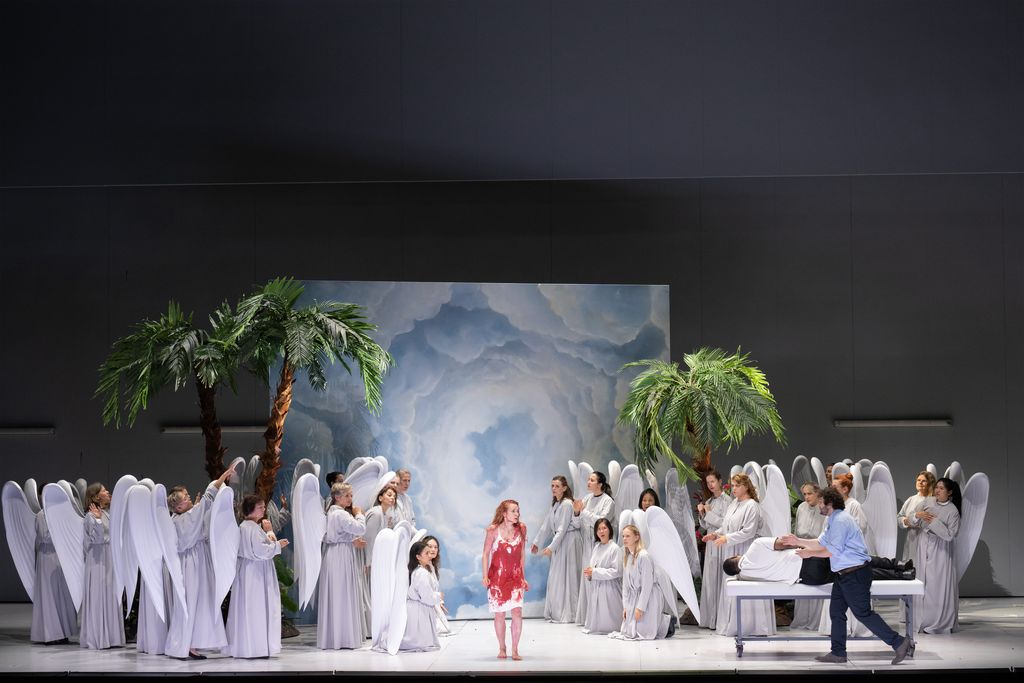
It is to emphasise this universality that he needs to include the audience in his message. To leave them as mere spectators of the world is to lie : wars are us, epidemics are us, compassion is us. Aristotle may have theorised catharsis, but Kratzer wants to go further to show that what the oratorio says and tells is not a distant oriental tale, but the eternal repetition of our history, our sufferings, our very human faults. And at the same time, paradise must appear to be an artificial paradise “paradis artificiel’ (without parodying the poet Charles Baudelaire or giving it the same meaning); it must appear as a vaguely childish, vaguely ridiculous representation of our dreams of paradise, with angels more angelic than nature, palm trees, and ‘celestial’ skies made of the pictorial blue of Giambattista Tiepolo's skies : he does everything to make this paradise ‘scenic’, almost a caricature of a cheap opera, a bad provincial opera, so that when we see these angels with their plastic wings moving, we can only smile, because obviously we cannot believe in it, we do not believe in it : that is what it is made for.
The representation of Paradise as it would appear in Peri's dreams or in our childhood dreams actually distances us from it, since the vision makes us smile. As we see it here, it is not desirable, and so we must inevitably seek it elsewhere. At the same time, this vision, shaped by centuries of right-thinking discourse but also by a certain way of representing it in painting, also shows that we are moulded by cultural tradition (and the representation of paradise is ridiculous in all religions ; it is a gentle opiate for the people, as someone once said). So, our effort must consist of breaking out of this mould, ‘freeing’ ourselves from it in a way.

The first scene is one of war and violence, a scene of blood : blood on the walls, then blood on Peri's clothes. Revolt against the tyrannical power of Gazna, leading to civil war. Peri falls into the world and the world is torn apart…rstep, whether in Ukraine or the Middle East. The vision of war is eternally relevant, as is that of the tyrant, but also that of the resistance fighter who dies for his ideals. It is thus that of the young hero who gives his life and his blood for his freedom and the end of tyranny. This gift from Peri is necessary, but undoubtedly not sufficient. It is a sign that Peri is ‘on the right side’, but she is still a spectator to the horror of the world and at the same time, Kratzer represents her as a kind of ‘pharmakos’, a receptacle for what others dare not (or do not want to) do, and who smear her with blood. They even pour a bucket of blood over her head (like Marie in Bieito's Die Soldaten in Zurich or Komische Oper Berlin, or Tannhäuser – who pours it over himself – more recently in Michael Thalheimer's vision in Geneva). The Peri thus becomes a kind of outcast.
It is then that we hear cries from the audience…
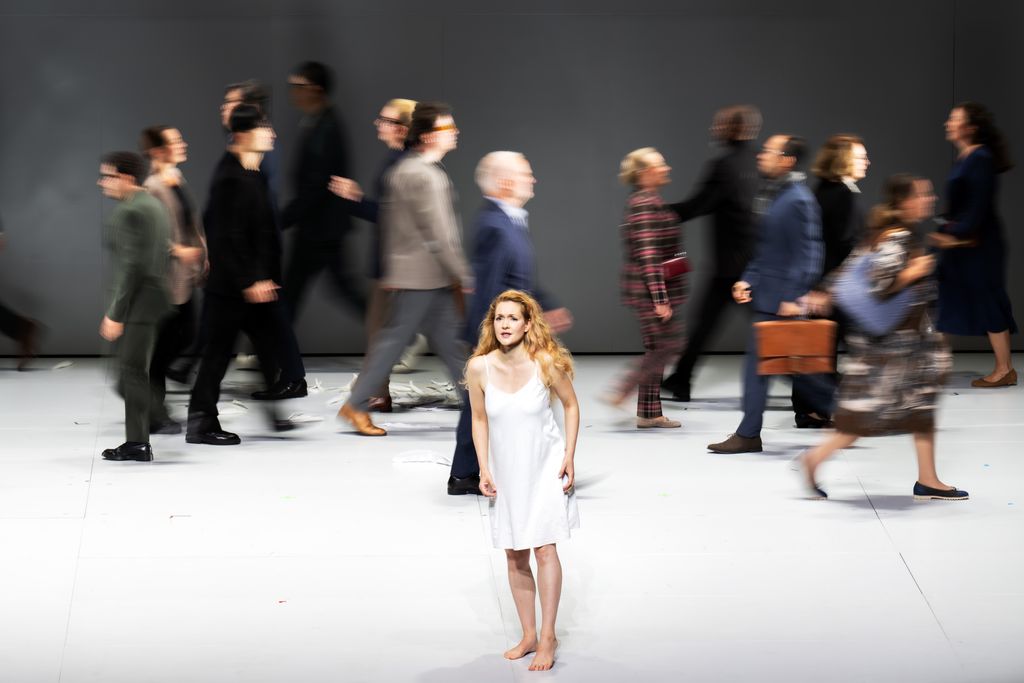
Kratzer does not need to transpose the world of war, as it is on our doo
Kratzer leaves legitimate room for public protest : this scene provokes a violent reaction in the auditorium, with a woman standing up and shouting, then storming out : at first, we think it is the usual booing of an anti-Regietheater (this is the very generic name I give to the usual protesters against today's productions), but then we realise that it is part of the play : the spectator, like all big children, must be allowed to give free rein to his passions. The spectator, who has been welcomed, is at home, and has many rights… The show plays with the spectator who shouts, sleeps, smiles and makes desperate gestures to the camera, playing their eternal role as spectator.
And even if it is deserved, shortly afterwards, at the end of this first part, the audience applauds this scene, as if by contrast, where the choir, Peri, blood, violence on stage and in the auditorium have all intertwined.
The second gift, which is Peri's second stop in the face of the world's upheavals, takes her to the heart of a terrible epidemic. The stage is filled with ‘barnums’ (small white tents) well known at the time of the Covid epidemic. And here Kratzer offers a direct view of the experience of all the spectators. The first part was an experience mediated by the media, the sounds of war without directly affecting the spectator through a reality effect ; the second is still an open wound in the experience of all societies, including European societies. The connection is made immediately. And the stage becomes so bright that it forces you to close your eyes in the face of such blinding light, like an evil that runs and forces you to close or avert your eyes. As if the spectator were himself excluded from the show.
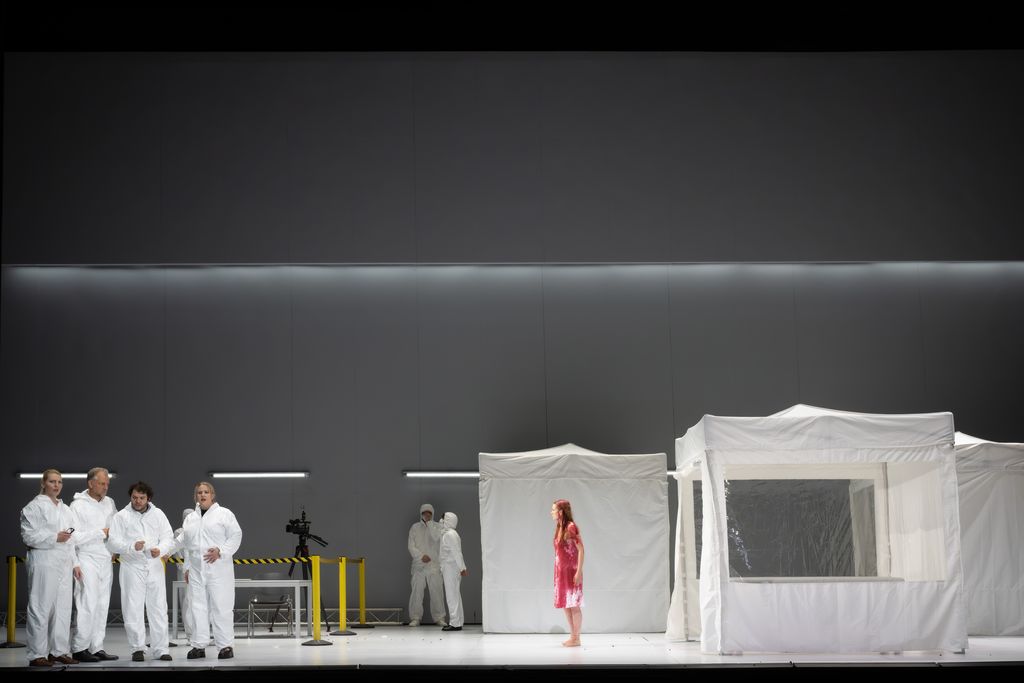
While the initial ‘Willkommen’ invited us to socialise, this scene clearly shows the group and the young man who is isolated in his marquee. And so this vision goes against compassion and empathy, since – as we remember – all affectionate or empathetic gestures were banned from everyday practices : greeting each other with an elbow bump, no more handshakes, no kisses, no contact.
So the young girl in love with the young man with the disease goes against the grain, breaks down the barriers and takes refuge with her beloved, taking on his illness and dying with him. She dies for love, refusing to accept the rules imposed by society for its own preservation. She dies of empathy.
By gathering the girl's last breath, the Peri grows in empathy for those who die of love : the vision of the two young people in their barnum on the stretcher is vaguely reminiscent of the Liebestod in Tristan und Isolde in Christoph Marthaler's vision in Bayreuth, being together whatever the cost and beyond fears, because there is no more fear when there is love.
The Peri's journey is gradual ; this second gift is just as necessary as the first, even more so because it ‘expresses the power of love’, but it is still insufficient, no doubt because the Peri is still a spectator.
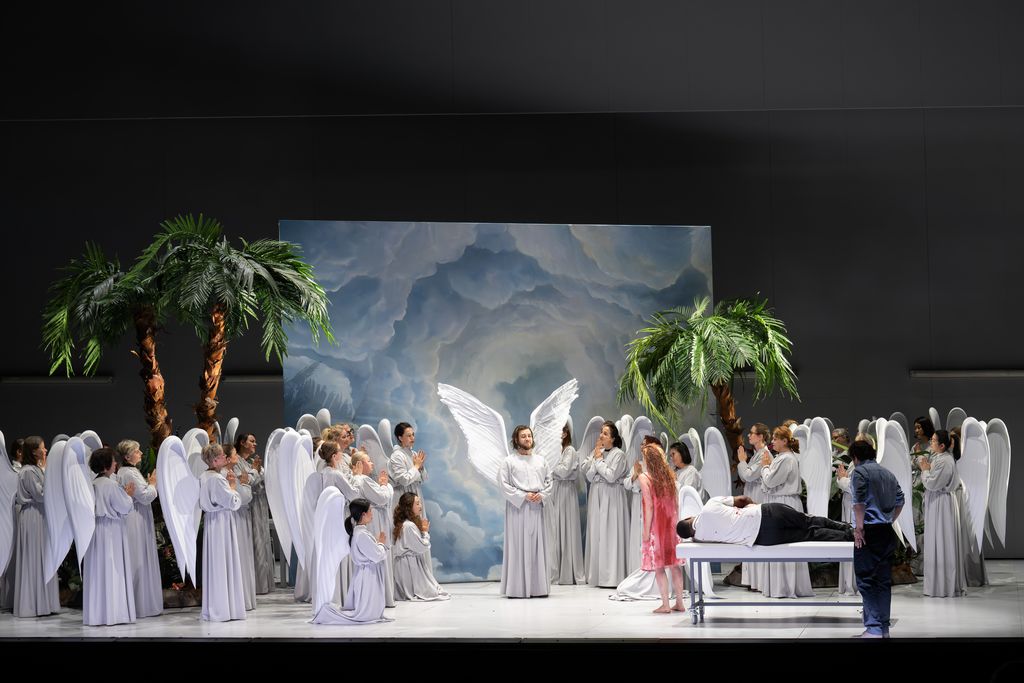
The transition between the second and third parts is very interesting. It begins with a rather sarcastic scene in which the couple who died of the epidemic and of love lie on a stretcher, and behind them, between two palm trees and a blue sky, the angels of paradise flutter about, almost like a scene from a musical that seems a little “out of touch”, where La Peri moves among the agitated angels, we don't know whether she is annoyed or weary, as if she were taking the misfortune of the world upon herself and the world of paradise didn't seem to care too much about it.
The Angel arrives and gives her a second refusal, in a kind of ‘Good, but could do better’ manner, meaning that the gift must be even more holy. The Angel leaves, the couple on the stretcher gets up and follows him, as if to signify that he is entitled to direct entry into Paradise, while the angels clear everything away (stretcher, palm trees, sky).
Then, in despair, Peri attacks the narrator, a discreet companion in his humanity, overturning the table where he is working on his computer (which he manages to hold on to at the last minute), but continues to hope. One is reminded of Oronte's sonnet in Molière’s Le Misanthrope …
« Belle Philis, on désespère,
Alors qu’on espère toujours ».
(‘Beautiful Philis, we despair,
While we still hope’.)
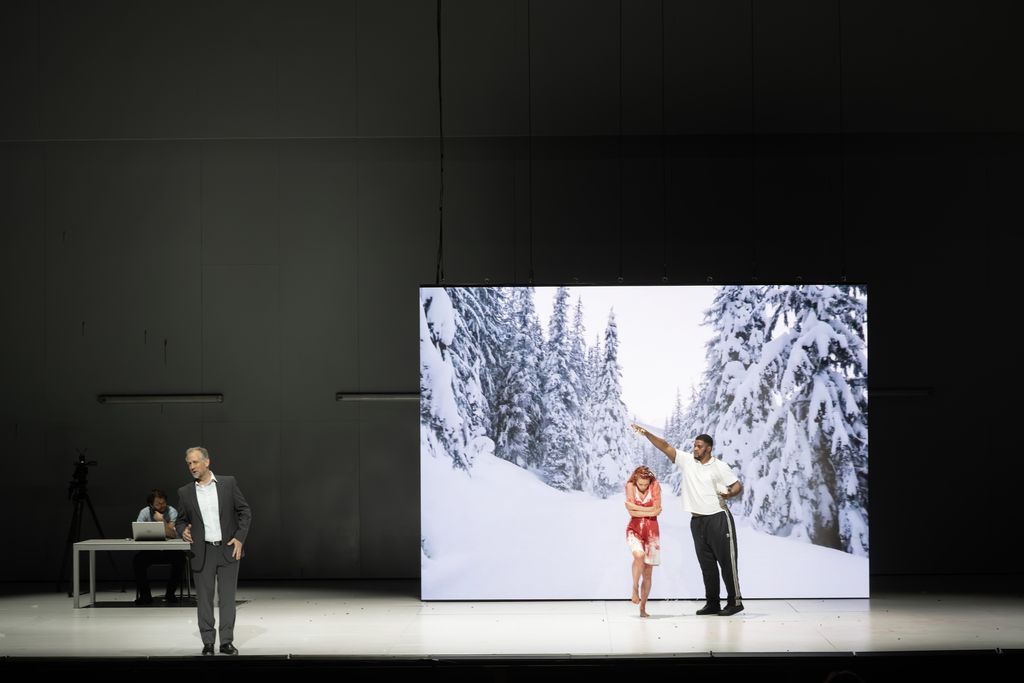
And she sets off again on her ‘Paradise road movie’, walking against a backdrop of summer mountain landscapes or harsh winter scenery, accompanied by those she has met along the way (a young hero, a young girl) who accompany her like ‘supporters’ on her walk, her run. Still in her light, blood-stained costume, on which a little snow is poured (an image not without poetry) as blood was poured on her, she is also accompanied by the angels of paradise, who are not very friendly in Kratzer's vision and seem to reproach her for her obstinacy : ‘you prefer paradise to the beauties of the world’. As mentioned above, this Paradise seems ridiculous, useless and truly lacking in empathy. Then this race to Paradise stops when the next stage appears…
The third and decisive gift is conceived differently by the director, who works directly with the audience, first with irony, then with empathy, breaking the fourth wall by bringing Peri into the auditorium.
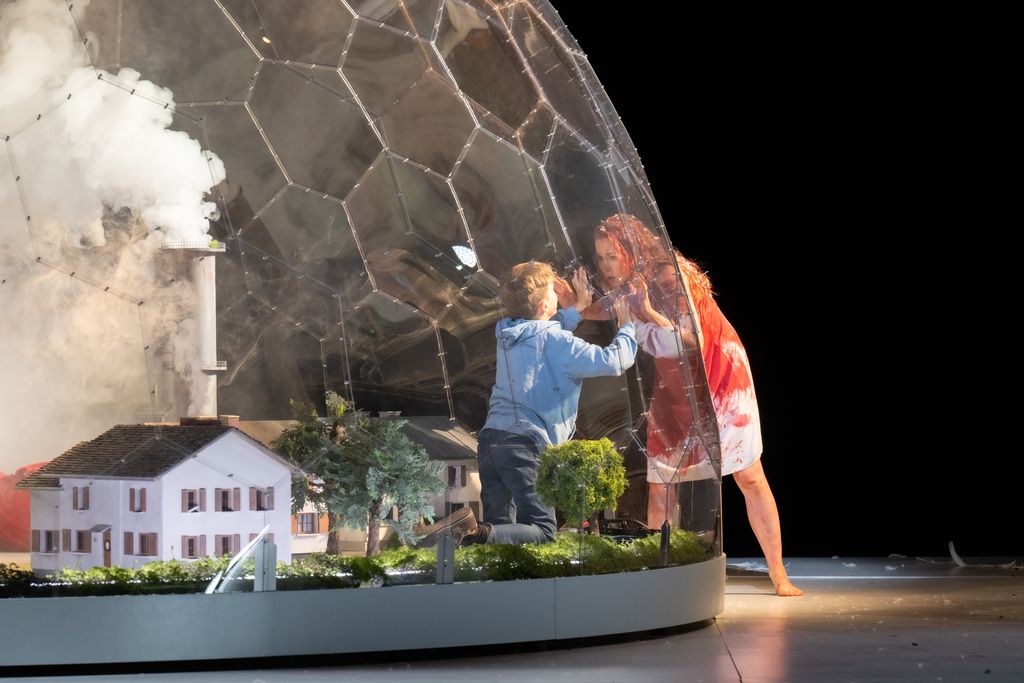
The back wall, which until then had served as a support for the screens and limited the stage space, opens up in the centre to reveal a translucent hemisphere that looks like a kind of jewel, preserved like an experimental world that can be viewed from the outside. Then we see inside a model of a city, with its parks and houses, and children playing, and in the sky, airplanes that never stop flying back and forth.
At first, it seems like a vision of a ‘green childhood paradise’, a little boring, and a view of the auditorium shows a spectator watching, his eyes growing increasingly vague, and who begins to fall asleep, much to the dismay of his wife, who doesn't know what to do to wake him up. As with the lady who booed earlier, for a few seconds we wonder whether this is ‘theatre’ or ‘reality’, especially since earlier we saw a few examples of (real) spectators dozing off in the auditorium, with the corresponding giggles from the audience. But we understand that this is once again a performance (the lady is really insisting and the gentleman is fast asleep). Step by step, things take a turn for the worse on stage. The joyful jewel of a land where children play becomes a smoky, polluted world where children are nothing more than victims of the poisonous environment and die.
Faced with this vision, the gentleman who was sleeping is no longer asleep. We see a close-up of his face on the video and he is suddenly more tense, serious, captivated, and begins to cry at the sight of this child victim.
La Peri then descends into the auditorium and, row by row, reaches the tearful spectator, walking on the backs of the seats, helped by all the (real) spectators who take turns to give her their hands so that she can move forward. This simple yet powerful image of human solidarity is one of the most striking moments of the evening.
We experience in turn human solidarity and compassion, and a sense of belonging to the same community. And so we understand the need from the outset to include the spectator, since here he is an actor in the dénouement.
She therefore reaches the gentleman in tears, and, caressing and comforting him gently, collects the tears of emotion that the sight of the child has brought forth.
She returns to the stage, gives the tears to the Angel and finally enters Paradise.
But here again, we understand that the man who is crying is undoubtedly one of those bourgeois opera-goers, perhaps a local industrialist (we are in Hamburg, which is not insignificant), a polluter and poisoner of this childish paradise, who suddenly, through art, through performance, through catharsis, becomes aware of what he has done.
As in Hamlet, truth emerges from theatre.
Here again, Kratzer addresses a local reality to show what role he now assigns to ‘his’ opera.
Then Paradise opens its arms to Peri, but not the one we had seen until then : no more white angels in turmoil, the choir becomes an oratorio choir once again. From angels dressed in white, we move to a choir dressed in black, arranged traditionally as in a concert, a discreet nod to classical rituals, and in the centre, the Peri in black, who has left behind her muse costume covered in the blood of the world, invited to join her song to that of the entire triumphant choir. We then realise that Paradise is art, it is Schumann's music, it is us communing with this ensemble and with the Peri. Paradise is the Opera, it is the place.
We finally understand the ultimate meaning of the initial ‘Willkommen’ when we hear the choir welcoming the Peri to Paradise, echoed in the subtitle quoted above : "Seid uns willkommen seid uns gegrüßt ! ‘ (Welcome to you, greetings to you), which brings to mind Wagner and his ’Du, teure Halle, Sei mir gegrüßt!‘ which closes Elisabeth's aria… We understand the meaning of the ’Willkommen" that welcomed the audience, which is also the welcome to Paradise, the opera house as a space of Paradise, in a way. And so Peri's destiny is superimposed on that of the spectator who comes to the opera, to art and music, to seek the highest expression of human Paradise, in a hall where one experiences compassion, solidarity and emotions, where one feels a kind of catharsis of humanity. The message is strong and at the same time programmatic : the world will be saved by the depth of humanity, and (implied) this is what we, the new team, are displaying…
But if Kratzer ended this show with its many different elements in a kind of emotional ‘Embrassons-nous Folleville’ (Let's kiss, Folleville), it would be singularly fitting…
Just as everyone is singing ‘Welcome’ to Paradise, La Peri, terrified of being sucked into the paradisiacal or musical ritual (take your pick), and now full of the lessons of experience, leaves the group and flees, alone, to live her own life. She has lived her ‘Paradise Road Movie’ and the three experiences have taught her to be free, not to depend on social demands and rituals, groups, beliefs. She has found her Paradise, neither where we dreamed it would be (little white angels against a backdrop of sky and palm trees), nor where we live it (at the Opera in contact with art and others). these are stages on the path that lead us to ourselves, perhaps the only Paradise… in a kind of ‘you have to cultivate your garden’ approach, which is a lesson in relativism…
So what Kratzer shows us here is a path of humanity, with his ironic and sometimes cruel view of the world (he had already used Covid marquees in one of the videos illustrating the opening of Tannhäuser in Bayreuth), a path of solidarity but at the same time a true individual claim in the end. But he places the artistic experience, and theatre, at the centre of experiences to be lived collectively in order to recharge one's humanity : there is no ‘individual paradise’ without going through a moment of collective experience, without awareness of the other ; there is no individual ‘in oneself’ who would be what Elisabeth Roudinesco calls in her famous book ‘ The Sovereign Self, Pitfalls of Identity Politics’ [1].
This was the first lesson of the programme for this new team, which gives hope for other experiences and other openings. And this lesson in humanity was also evident in the children's opera performed at the same time, Die Gänsemagd, which we reported on.(in French).
A musical success
The production of Das Paradies und Die Peri marks the beginning of Tobias Kratzer's tenure as artistic director, and, as we have seen, as a director, since he had never worked in Hamburg before. But just as importantly, this production marks the beginning of Omer Meir Wellber's tenure as Generalmusikdirektor (GMD).
Wellber began his career with Daniel Barenboim in Berlin and La Scala, and continued it in Israel, Dresden and Palermo (read our review of his Parsifal here in French), and Vienna, before becoming GMD in Hamburg and undertaking new and even risky projects to expand the repertoire, explore contemporary works and put them into perspective, and create new works, in the great tradition of the Hamburg Opera, where Telemann and Mahler, among others, worked, as did Rolf Liebermann, and where many works were premiered.
He is particularly active, both as a musician and as a writer (he is the author of a novel, Les absences de Haïm Birkner, published in Germany in 2019 and translated into French and italian[2], as well as a fascinating essay on Mozart, co-written with Inge Kloepfer, Die Angst, das Risiko und Die Liebe, Momente mit Mozart, Ecowin, Salzburg 2017 (Fear, Risk and Love, Moments with Mozart). He is therefore a multi-faceted personality who is sure to surprise.
With Das Paradies und Die Peri, he tackles a repertoire that is little known on the opera stage, even if here and there stage or semi-concert performances have taken place, with a clear concern for maintaining the balance between orchestra, choir and soloists in order to create the impression of a total artwork (‘Gesamtkunstwerk’) in which everyone has found their place, starting with the orchestra, which he conducts with great precision, but also with a certain roundness and flexibility, but above all with great sensitivity, obtaining diaphanous sounds from his musicians, a permanent lightness allowing the voices to flourish, but remaining constantly present, without languor, with a marked dramatic sense and a sound that remains fleshy most of the time, giving this Schumann a full, even youthful, fresh, sometimes lively colour, perfectly matching the figure of the Peri. There is an obvious dynamic here, reinforced by the commitment of the orchestra, which feels perfectly in tune with the conductor, without any slack.
Unquestionably, he creates a sound universe made up of softness and tremors, breaks and calms, but without ever abandoning a real, attentive breath, which gives the pit its role as master of time, tempi, rhythms and atmospheres and, with the complicity of the staging, makes this Schumann (who was seeking other paths for opera) fully theatrical.
And, happily imitating a practice commonly used by Daniel Barenboim, he brought the orchestra on stage to take their bows, eliciting an enthusiasm from the audience that is rarely seen in Hamburg.
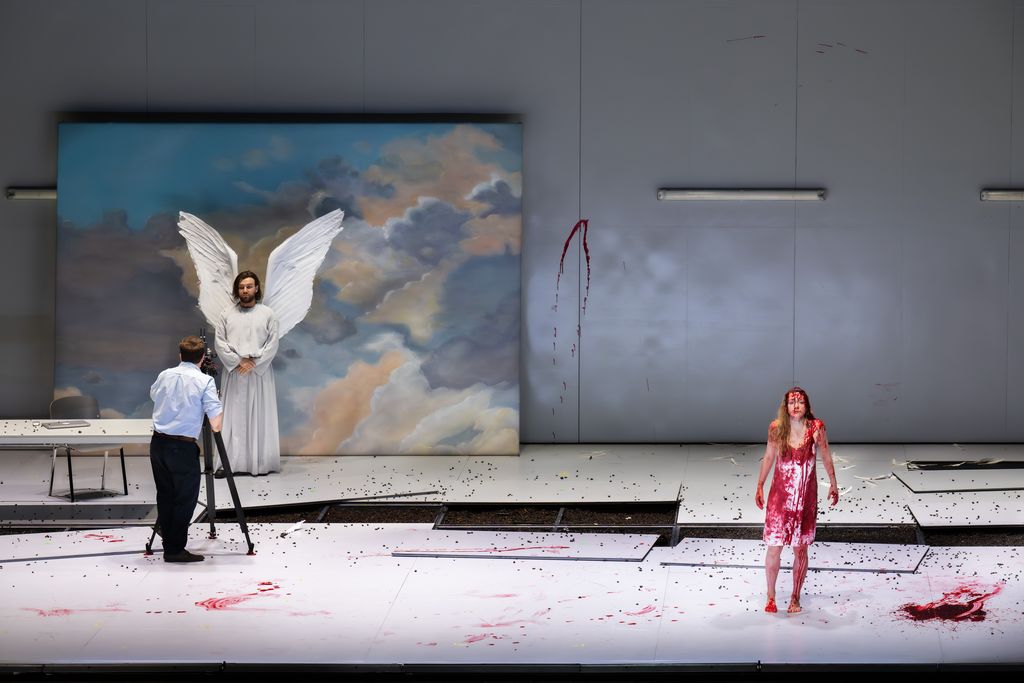
As we have emphasised, this is a true Gesamtkunstwerk, a total artwork, in the true sense of Wagner, whose shadow is not so far away. We must also highlight the essential role of the choir, long conducted by Eberhard Friedrich (also Chorus Master in Bayreuth until 2024) and now prepared by Alice Meregaglia, as a mediator of the entire performance in more ways than one. First, through the excellence of their performance, their precision and the clarity of their diction. Secondly, through its commitment on stage, both when portraying heavenly angels and the very earthly crowd, each time interacting with the Peri : one senses a real joy in being there and ‘playing’; and finally, by the varied colours according to the interventions (as we have pointed out, there are many, 12 out of 26 numbers), either in the evocation of oriental delights, from India to Syria, including the evocation of Lebanon, but also in less ‘picturesque’ moments, which refer more to Bach (in the first part and obviously in the last). Inevitably, the models of the great predecessor (who casts an immense shadow over the very place where this work was created) are present in the background, even for a secular oratorio. This can be clearly felt in the role of the tenor, who is the narrator, who illuminates and recounts the work, and in the staging, the person who holds and directs the camera, a kind of mediator himself, alongside the choir.
The final element in the success of the evening was the ensemble of solo voices, which formed a very homogeneous whole, chosen from among names that are now fairly well known (such as Annika Schlicht, alto, or of course Vera-Lotte Boecker) but not stars. Here again, this choice speaks volumes. Hamburg was an opera company that was a reservoir of future stars (Placido Domingo, Kurt Moll and Hans Sotin, for example) and still retains something of that spirit. Moreover, the notion of stardom in opera is dwindling, due to a lack of star names and also because the record industry, which used to be a star-making machine, is no longer at its best. Regardless, the cast shows that an opera can triumph without stars : in any case, the new team in Hamburg will not have a taste for stars.
We must therefore first praise the quality, shared by all, of the diction of the text, which is incredibly clear, an essential quality in oratorio. Everything is clear and understandable, with impeccable phrasing for all, including in the episodic roles, all of which are particularly well performed. Kady Evanyshyn (who sings the mezzo-soprano part), a member of the troupe, with her warm timbre, Eliza Boom, whom we discovered among the notable members of the Bayerische Staatsoper Studio (in Munich) and who has also been a member of the troupe since the start of this season, Annika Schlicht, one of the most notable mezzo-sopranos in Germany today, with a rare expressiveness (she was a magnificent Fricka at the Deutsche Oper Berlin in the Herheim production), who has also just joined the Hamburg troupe.
Among the male voices, let us note the delicate Jüngling, with his clear and finely chiselled voice, sung by South African tenor Lungo Eric Hallam, a voice with a Rossinian colour,

but also – triumphantly – that of Russian countertenor Ivan Borodulin as the Angel (usually sung by a contralto), who opens and closes the gates of Paradise, with his masterful control and, above all, his clear delivery, gifted with outstanding diction (every word is understandable, almost sculpted) and beautiful projection. Entrusting this role to a countertenor is obviously a reminder of the 18th-century tradition of castrati, and thus also gives the character a different colour, not without irony : a bearded Angel is rare in iconography!!!
Christoph Pohl is a familiar face in Hamburg, where he is a Kammersänger, and he is a much sought-after baritone : here he is both the baritone voice, the tyrant Gazna and a Man, with beautiful projection and very clear phrasing and many variations in colour (Gazna the tyrant does not have exactly the same colour as the other two parts).
Another big success of the evening was the tenor voice of Kai Kluge, who belongs to the Stuttgart troupe. He is the narrator and, as we have said, the one who operates the camera and the computer, that is to say, he represents the ‘organiser of the fable’. His voice is clear, rich and expressive, with a timbre that, in my opinion, suggests not only Mozartian roles (which he sings), but also Weberian and undoubtedly Wagnerian ones : behind this timbre, we can hear a Titus, a Max or a future Lohengrin. What is striking here is the perfection of the style without any mannerism, the meaning of the words, the play on colours, the clarity of the timbre, and the magnificent projection, but also a genuine humanity in the interpretation. A real discovery.

Finally, the Peri is Vera-Lotte Boecker, who is exemplary in every way. Exemplary in her diction and phrasing, each word is chiselled, marked by clarity, perfectly projected and wonderfully supported by her breath. The high notes are luminous, broad and well supported (something we already noticed in her Donna Anna in Munich last summer). But she is also and above all an outstanding, sensitive performer who knows how to convey both fragility and determination. A weak woman who knows what she wants, gifted with a remarkable stage presence and singing with incredible intensity and a rich, varied expressiveness that always goes straight to the heart. The entire scene of the third gift, in the hall, radiates a particularly heartfelt emotion that carries the audience away.
It is a true ‘creation’ in the noble sense of the term. She creates a character that I think will remain attached to her.

This inaugural production is a calculated risk, because in addition to the artistic challenge posed by a new team, there is also the necessary cohesion of the theatre's technical and artistic teams, who need to be carried along by new horizons, a new atmosphere and real success. There is also the challenge of the audience, which is particularly pampered, in a theatre where attendance has declined somewhat in recent years. It is interesting to note that opera fans from outside Hamburg have sometimes taken a dim view of this production, while the Hamburg audience has welcomed it with enthusiasm (standing ovations, cheers, etc.). This production is indeed a multi-pronged weapon, aimed primarily at the local audience, the essential target, rather than at opera tourists who, by definition, have seen so many others… However, and this is where the intelligence of the project lies, the production shows that it is possible to represent a work by Schumann that is so deeply rooted in tradition, romanticism, orientalism and picturesque style by immersing it in a contemporary setting, making it speak directly to us, to our anxieties and our hopes, without the slightest hint of misinterpretation : all the crutches invented by societies to maintain a ‘just order’ (which is always the order of the strongest) ultimately deny the individual and their freedom.
Seeing Peri leave the stage, the group and the ‘opera-paradise’ to ‘run away’, I couldn't help but think of the conclusion of Tcherniakov's Ring in Berlin, where Brünnhilde, smiling, having followed her path, finds herself thinking, much like Peri : The world belongs to me.
[1] Elisabeth Roudinesco, The Sovereign Self, Pitfalls of Identity Politics, Translated by Catherine Porter, Polity Press, 2023
[2] Omer Meir Wellber,
Die vier Ohnmachten des Chaimm Birkner, Roman, Berlin, 2019
Storia vera e non vera di Chaim Birkner, Sellerio, Palermo, 2021
Les absences de Haïm Birkner, Editions du Sous-sol, 2022
